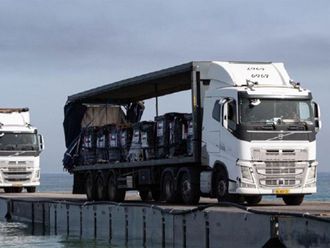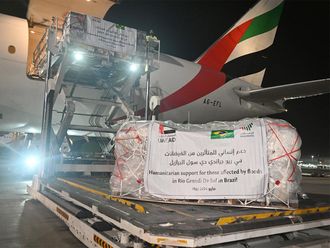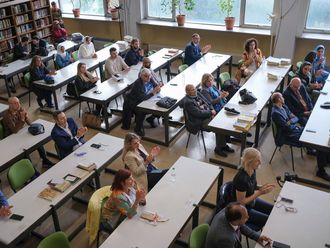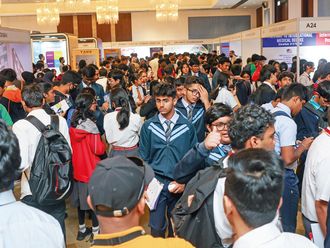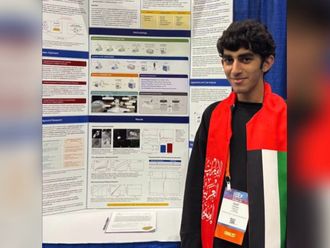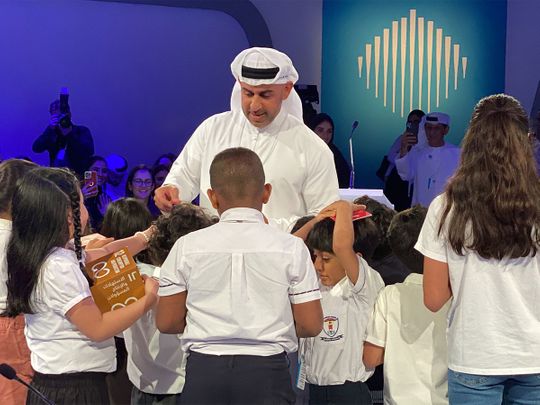
Dubai: A pre-event session of the World Government Summit 2023 in Dubai on Sunday witnessed a top UAE official rewarding young SDG ambassadors with shopping vouchers.
The young ambassadors of the United Nations’ 17 Sustainable Development Goals (SDGs) received the surprise gift from the Deputy Minister of Cabinet Affairs for Competitiveness and Experience Exchange and Vice Chairperson of the UAE National Committee on SDGs, Abdulla Nasser Lootah.
The school children, who are championing the SDGs, had initially appeared to display the logos representing each SDG and were called back on the stage by the minister just before he delivered the opening remarks at the ‘SDGs in Action” session.
Thanking the children for championing the cause of SDGs during a weekend when they were supposed to be playing somewhere else, he gave away shopping vouchers of a prominent toy store to all of them, drawing a loud round of applause from the audience.
Global Councils on SDGs’ story maps
Speaking at the session, Lootah announced the launch of Global Councils on SDGs’ story maps in partnership with Esri, a leader in geospatial information technology.
The Global Councils on SDGs is an initiative launched during the ‘SDGs in Action’ event at WGS in 2018. It is a cross-collaborative project between the UAE Prime Minister’s Office (PMO) and the Federal Competitiveness and Statistics Centre (FCSC).
“The story maps-centralised approach of the Global Councils on SDGs engages many youth members of the councils in their GIS applications capacity,” Lootah said.
The story maps will drive impact, share updates and also deliver on the innovative work programmes, he said.
Speaking to Gulf News later, Lootah said story maps using geospatial technology can help government officials, private sector and communities to address various issues.
“Geospatial technology helps us have a bird’s eye view of the planet Earth and it can help learn things in a broader way and help in the decision-making process. These technologies can help you understand what’s the current situation and prevent the situation from becoming worse,” he said, giving examples of floods, fires and traffic jams.
We can also plan the establishment of schools, hospitals and other service facilities using the geospatial data, he added.
WGS and SDGs
In his speech, Lootah also called for greater participation of the private sector in achieving the SDGs. He said addressing the United Nations’ 2030 Agenda for Sustainable Development has not been an easy task [for any country].
“The SDGs cannot be achieved without global partnerships, collaboration and cooperation,” said Lootah.
Talking about how the World Government Summit has been championing the cause of SDGs, he said: “Since the announcement of the ‘SDGs in Action’ in 2016, we have been walking the talk about partnerships for the goals. The World Government Summit fosters global partnerships by bringing thought leaders together to shape the future of governments and humanity and accelerate the implementation of the 2030 agenda.”
Addressing the global leaders in their role to implement SDGs, Lootah said: “First and foremost, we must acknowledge that fulfilling the SDGs is a moral and economic necessity. According to the World Bank, achieving the SDGs could add up to $12 trillion to the global economy by 2030. And yet, we are currently falling short. According to the most recent data, we, as a global society, will not achieve one single SDG by then. Shame on all of us.”
Discussing the key elements of global partnerships that can support in reaching the SDGs and turning things around, he said: “First, we need to recognise the interconnection of the 2030 agenda. We cannot address poverty without addressing education, hunger, inequalities, climate change…and many more. We need to approach the SDGs in a holistic and a coordinated manner and we see this taking place through the successful model of the councils [Global Councils on SDGs,”
Role of private sector
Lootah said: “We all recognise that the private sector plays a pivotal role in achieving the SDGs, being responsible for 80 per cent or more of the global economy. The private sector can provide the resources and innovations to achieve the SDGs by 2030. Include them in your dialogue, and then invite them to participate in your work…All countries must act and be united towards global prosperity. Every one of us in our personal and professional activities have a role to play in achieving the SDGs.”
“Leaders, governments, private sectors, international organisations, nonprofit organisations, and others have the power to shape societies and mobilise the resources that are necessary to achieve the SDGs and shape our common future.”
“Encourage and mobilise the private sector to contribute to the success of your work programmes, create sound networks during the SDGs in Action event at the World Government Summit to drive impactful and meaningful partnerships,” he urged the delegates.



